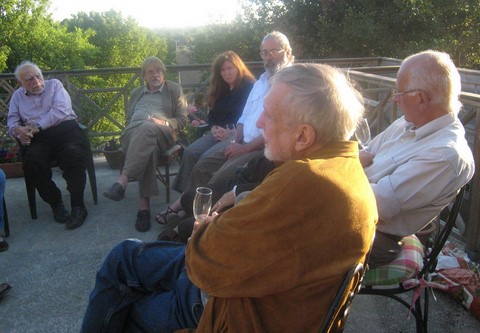Remembering the bright life of Milton Zysman
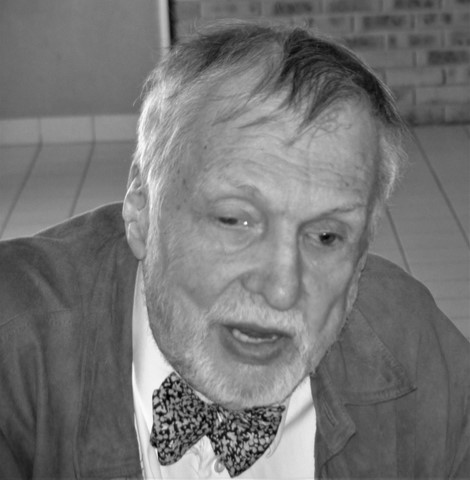
Milton is dead, by Federico Allodi
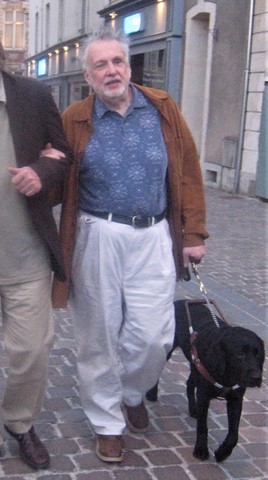
The room is empty, the telephone and the computer on the table,
the bed nearby, clothes and a few books left there.
He is gone and we remain in the rooms we inhabit,
with the dark scent of our lives, their heavy humidity
or dryness still here now without his visits,
his conversation like a release from the traps
of the daily chores of living and moving among
indifferent others, till there is no more barter or rest.
When Milton dies the chairs and walker, the room
come back like a walk in the afternoon,
the trip shopping, the chat in the coffee bar,
a well researched and yet indifferent meal,
the dreams and the vagaries, the writings, the efforts
to become, to survive independent a month more,
a thank you, a smile, a hug more, the slow maceration
of the flesh and the words to keep the soul
our old companion entertained and trapped
before as expected it travels still unrecognized
and unknown.
Toronto, September 2, 2019.
A few words by Mark Thibodeau
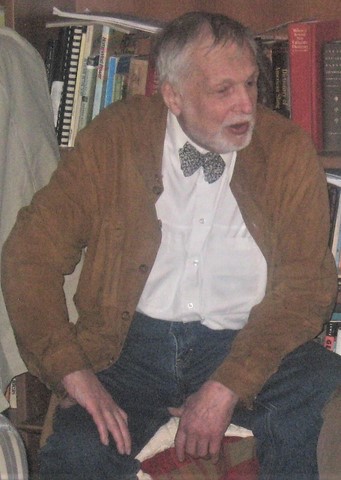
I want to say a few words about the passing on Sunday of my very good friend (and ongoing partner in thought-crime), Milton Zysman.
I will have more to say (a LOT more) soon, to a more select audience. But for now, I just want to say that if ever there was a human being who could legitimately be called "young at heart", it was Milton.
The man was 83 years old, had been 100% blind since the early 1970's, and on a thrice-weekly cycle of dialysis for roughly the same length of time (unheard of, apparently). And yet he never lost his lust for life, nor his passion for exploration, nor his appreciation for the finer things in life... fine food and drink, the best of the arts, and the company of beautiful and intellectually stimulating women.
He was also stubborn and fearless, and these qualities caused him to take more than his fair share of falls and tumbles. Milton cheated death with a frequency that could make felines turn green with envy.
Milton was a composer of limericks (for both general and restricted audiences), and a connoisseur of bawdy jokes and classic comedy. His laugh was loud and joyful, an infectious laugh. He would throw his head back, his mouth would open wide, and he would howl in delight. I will cherish every time I was able to make him laugh, and I'm certain
that Matt Pollack, who spent almost as much time with Milton as I did, feels the same way.
Finally, Milton was a man who felt deeply. A favorite song never failed to move him to tears, and the reverential awe that he felt before the unimaginable magnificence of our impossibly vast universe, and the forces that have shaped it, will forever be an inspiration to me.
Farewell, Milton. I sincerely hope that all your questions have now been answered.
Love,
Mark Thibodeau
Gunnar Heinsohn: Goodbye to Milton B. Zysman
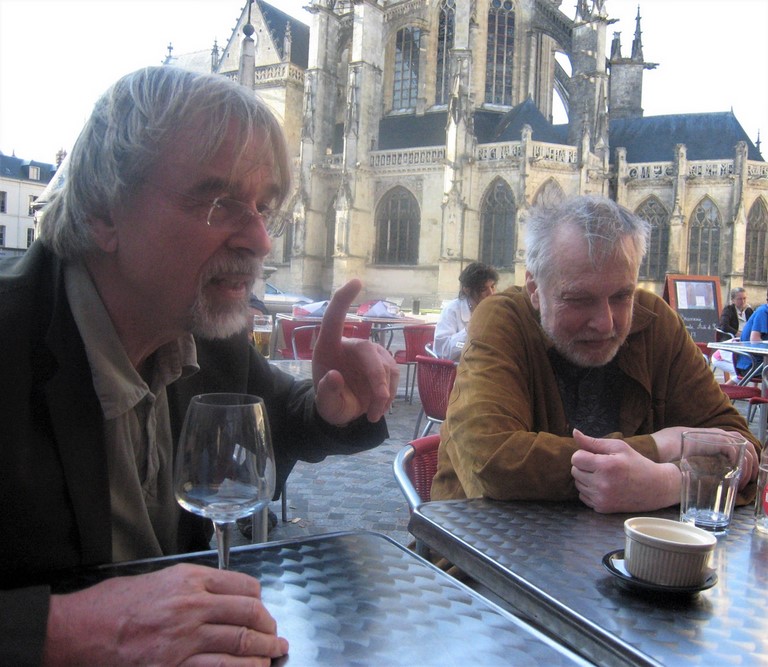
Gunnar and Milton in La Ferté-Bernard (France), June 2010
1. First meeting.
In 1981 an interdisciplinary conference brought me to Toronto for the first time in my life. I had a phone number for further details. It was Milton who answered and duly gave me the whens and whereabouts. Suddenly he proposed a meeting prior to the conference. I should come to a Swiss Chalet franchise on Bloor Street and chose a table in its right corner. He would find me. In any case he would wear an easily recognizable red sweater. He found me. We talked for hours. Included in our conversation, of course, were the uncertainties of a Jew scrutinizing a German. And Milton did not yet know that, on the first day of the Second World War, my father helped to bring it on as a gunnery officer on the battleship Schlesien that shelled Poland’s main navy port from its 28 cm twin turrets. I never met him because – in May 1943 – he lost his life as a submarine commander off Newfoundland. When, a few years later in our bond, I confessed to Milton about my family he cut me short with: ‘stop boasting.’ When he left our first meeting, Milton pulled out something metallic and unfolded it to help him find his way out of the place. Until that moment, I had not realized that he could not see me. I had come across a man of superior vision.
2. Bobbie, Milton, and me in Ambergris Caye.
In the mid-eighties I came up from Peru to Belize. Milton flew in from Toronto. A small boxer, Roberta, was with him as his Seeing Eye dog. He called her Bobbie. My enthusiasm for canines was quite limited. We found a small plane, actually a very tiny one, from the Goldson airport in Ladyville that brought us to Ambergris Caye. It turned out that my nearly forgotten problem with height had not disappeared at all. I could see through the sea right into the jaws of the sharks. Milton’s doubts of my observations were confirmed by the pilot.
We had rented a house a kilometer outside of the island’s capital, San Pedro. Our evening walks on the beach passed a few villas with white fences and larger than average Doberman watchdogs, not only barking fiercely but also getting ready to jump at me. Milton – slightly annoyed by the interruption of our debate on mirror-like reflecting skies of the past – let me know that they were more keen on Bobbie. She appeared to have donned a second coat of fur. It turned out to be a cloud of mosquitos. Her sacrifice left us unstung. San Pedro looked even more threatening because it was full of stray dogs, and they were not behind fences. They, too, preferred Bobbie. Yet, she did not seem to see them. At least she did not look at them. She just kept walking. And it was exactly that what caused even the largest specimen around us to fall silent. Bobbie’s controlled disregard had terrified them. She had been trained for such a self-assured manner. I was travelling with two friends now.
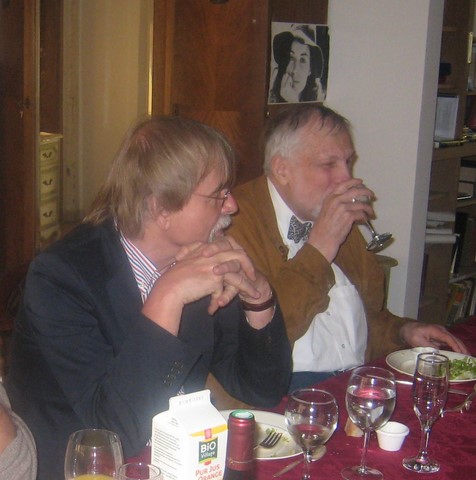
In 2003, Milton gave a lecture in Erfurt, Germany. He addressed a group of Austrians, Swiss, and Germans. His guide dog stood by his side. I was in charge of the slides. He had to explain what people of the Bronze Age might have seen in the sky before the cataclysm that triggered the Iron Age and changed our celestial environment. Looking upwards and using his hands to guide us, Milton gave us his description. Even people with little spatial imagination got the impression that they eventually could understand what, of course, had already been discussed in our trans-Atlantic network on catastrophes of the past. Milton had made them see. Whenever I meet participants of that conference, they ask about him. Of course, he impressed them deeply as a scholar. His genius did not escape them. But he also moved them. Most had never met a Jew.
4. The Polish connection.
When Tadeusz, my Polish son, was younger, and Joanna once asked him to take out the garbage, he protested that this was the job of “the German”. I did not mind. Poland had a hard time with my country, too. It is still my duty to dispose of the trash. When people were surprised seeing me for such long periods in Toronto, in the Milton Hilton on Prince Arthur, he calmed them that this was just his German slave and that I was harmless. We always laughed about it, and I loved him for that icebreaking and charming wisdom.
Good bye and Shalom, Chaver. Embraces for all the family.
Gunnar
A little biography
(from: Conference of Quantavolution, Villaines-la-Gonais, 2010)
Milton Zysman, a native Torontonian, received a Bachelor of Arts degree at University College, University of Toronto, in 1958. Graduated from the university's law school in 1962.
Professional activities
Involved since 1960 in the design and production of machinery and components for the international bedding and furniture industry.
1977: purchased the film rights to A Shining Furrow, subsequently released as Circle of Two, a feature film starring Tatum O'Neal and Richard Burton, directed by Jules Dassin. Sold screenplay to Film Consortium of Canada, for cash, a percentage of profits and credit as executive producer.
The Earth Sciences
Took a strong interest in neo-Catastrophism in the Earth Sciences. Wrote and lectured on the subject. Founding member of CSIS, (The Canadian Society for Interdisciplinary Studies) and published its newsletter. Helped organize annual seminars and funded and organized an international symposium at the University of Toronto campus in 1990 entitled ‘Velikovsky Reconsidered"
In this century:
2002-2005: raised funds for the production of The Song Is You a musical food bank benefit review, celebrating the career of Oscar Hammerstein. Starring the Toronto Mendelssohn Choir, it opened at Toronto's Hummingbird Centre, May 19th 2005.
In 2008, entered into a joint venture with Gunnar Heinsohn to produce a documentary provisionally entitled The Earth Builders, focusing on the role of comets in planetary evolution.
PUBLICATIONS:
Catastrophism 2000, Toronto July 1990 Co-edited with Clark Whelton
Tales of a recent comet, Toronto July 1997 (With Frank Wallace)
